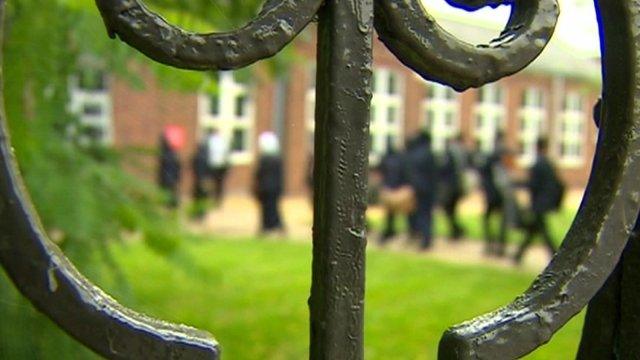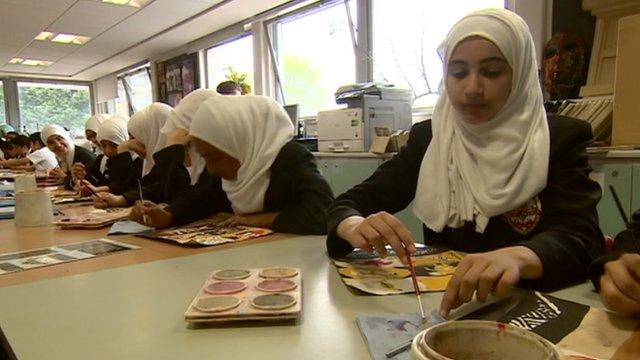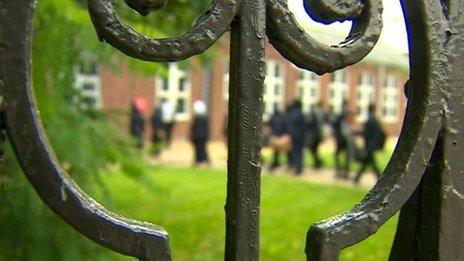Overlapping 'Trojan Horse' inquiries criticised by MPs
- Published

Overlapping inquiries into the Trojan Horse affair led to a "sense of confusion and crisis", the MPs found
MPs have criticised a "worrying lack of coordination" between five overlapping official inquiries into the so-called Trojan Horse affair.
It was alleged last year extremists had tried to take over several schools in Birmingham to advance radical interpretations of Islam.
A series of official investigations found the claims to be groundless.
The Department for Education (DfE) says it is "building resilience" by actively promoting British values in schools.
In its report, the education committee investigates how the DfE, Ofsted and other bodies reacted to the allegations of extremism in Birmingham, and draws out wider lessons for the entire school system.
'Wasteful'
The chairman of the education committee, Graham Stuart, said that apart from one incident in one school "no evidence of extremism or radicalisation was found by any of the inquiries in any of the schools involved".
The MPs had found "a worrying and wasteful lack of coordination between the various inquiries carried out by the DfE, Birmingham City Council, the Education Funding Agency, Ofsted and others", Mr Stuart said, adding that those overlapping inquiries had "contributed to the sense of crisis and confusion".
The report criticises the Department for Education for what it calls a "lack of inquisitiveness" and says the department was "slow to take an active interest" in the allegations.
The report also criticises Ofsted's "inability to identify problems" in schools on first inspection, when they were found "shortly afterwards to be failing".
The committee concluded that Ofsted would now have to "act to restore confidence in the inspectorate".
"Questions have been raised about the appropriateness of Ofsted's framework and the reliability and robustness of its judgements," Mr Stuart said.
In 2011, the education committee called for Ofsted to be split in two, saying separate bodies should supervise child protection and schools.
The education committee's latest report recommends the government should:
ensure that there is more coordination between inquiries by different agencies in the future
draw together the recommendations from all the investigations and set out its response
keep under review its arrangements for sharing information effectively between the various bodies responsible for oversight of schools
make an annual written ministerial statement on the priorities and achievements of the DfE's due diligence and counter-extremism division
continue to monitor the situation in the individual schools affected in Birmingham to ensure that the students receive the education they deserve
'Significant impact'
Ofsted said in a statement that it welcomed scrutiny, "continually strives" to improve inspection, and would consider the committee's recommendations "carefully".
"As the chief inspector, Sir Michael Wilshaw, made clear to the committee last year, sudden changes in governance and leadership can have a significant impact on the standards in education. These Birmingham schools were no exception," the statement said.
"Ofsted is committed to ensuring that such drastic declines are not repeated elsewhere and will continue to work closely with other agencies to identify and investigate any areas of concern.
"All schools have an expectation on them to teach values such as tolerance and the rule of law and prepare pupils for life in modern Britain.
"From September 2015 Ofsted will begin conducting shorter more frequent inspections of good schools.
"Our new approach will mean that signs of decline can be spotted early and the necessary action can be taken to ensure pupils are receiving a broad and balanced education which prepares them for life in modern Britain."
'Determined action'
The DfE said the understanding of extremism and way the ability of schools to respond to it is monitored had "advanced hugely in the past few years".
"As today's report recognises, we are tackling this problem at both ends: taking determined action where we find areas of concern, and building resilience in the system by putting the active promotion of fundamental British values at the very heart of our plan for education," it said.
"We are putting in place a helpline for schools to raise extremism concerns more easily and are working closely with Ofsted, having strengthened their inspection frameworks to include Fundamental British Values.
"No government has done more to tackle extremism, but we remain vigilant. We will respond to the report's recommendations in due course."
The select committee's report has been welcomed by unions.
Mary Bousted, the general secretary of the Association of Teachers and Lecturers (ATL), said the Trojan Horse affair had led to "a national panic".
"It seems that there are too many cooks spoiling the broth, with schools accountable to many different organisations and agencies - this causes confusion and overlap," she said.
"Radicalisation is a hugely complex issue and many teachers understandably have not received the training or support to enable them to confidently spot the early signs.
"We worry that Ofsted - as it has shown in other areas of inspection - also lacks the extensive expertise in matters of extremism that are necessary for it to investigate effectively."
- Published16 July 2015
- Published11 June 2014

- Published9 June 2014
